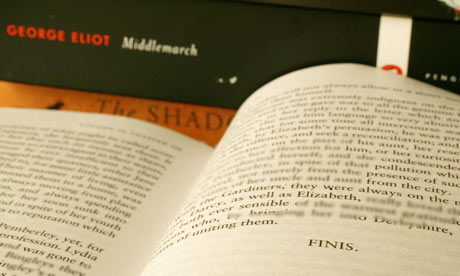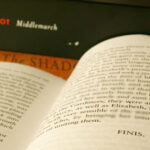How Well-Read are You–BBC’s 100 Book Test
Have you read more than 6 of these books? The BBC believes most people will have read only 6 of the 100 books listed here. . Bold those books you’ve read in their entirety Italicize the ones you started but didn’t finish or read an excerpt.
63 read, 5 on the go or abandoned.
1. Pride and Prejudice – Jane Austen
2 The Lord of the Rings – JRR Tolkien
3 Jane Eyre – Charlotte Bronte
4 Harry Potter series – JK Rowling
5 To Kill a Mockingbird – Harper Lee
6 The Bible
7 Wuthering Heights – Emily Bronte
8 Nineteen Eighty Four – George Orwell
9 His Dark Materials – Philip Pullman
10 Great Expectations – Charles Dickens
11 Little Women – Louisa M Alcott
12 Tess of the D’Urbervilles – Thomas Hardy
13 Catch 22 – Joseph Heller
14 Complete Works of Shakespeare
15 Rebecca – Daphne Du Maurier
16 The Hobbit – JRR Tolkien
17 Birdsong – Sebastian Faulks
19 The Time Traveller’s Wife – Audrey Niffenegger
20 Middlemarch – George Eliot
21 Gone With The Wind – Margaret Mitchell
22 The Great Gatsby – F Scott Fitzgerald
23 Bleak House – Charles Dickens
24 War and Peace – Leo Tolstoy
25 The Hitch Hiker’s Guide to the Galaxy – Douglas Adams
26 Brideshead Revisited – Evelyn Waugh
27 Crime and Punishment – Fyodor Dostoyevsky
28 Grapes of Wrath – John Steinbeck
29 Alice in Wonderland – Lewis Carroll
30 The Wind in the Willows – Kenneth Grahame
31 Anna Karenina – Leo Tolstoy
32 David Copperfield – Charles Dickens
33 Chronicles of Narnia – CS Lewis
34 Emma – Jane Austen
35 Persuasion – Jane Austen
36 The Lion, The Witch and The Wardrobe – CS Lewis
37 The Kite Runner – Khaled Hosseini
38 Captain Corelli’s Mandolin – Louis De Berniere
39 Memoirs of a Geisha – Arthur Golden
40 Winnie the Pooh – AA Milne
41 Animal Farm – George Orwell
42 The Da Vinci Code – Dan Brown
43 One Hundred Years of Solitude – Gabriel Garcia Marquez
44 A Prayer for Owen Meaney – John Irving
45 The Woman in White – Wilkie Collins
46 Anne of Green Gables – LM Montgomery
47 Far From The Madding Crowd – Thomas Hardy
48 The Handmaid’s Tale – Margaret Atwood
49 Lord of the Flies – William Golding
50 Atonement – Ian McEwan
51 Life of Pi – Yann Martel
52 Dune – Frank Herbert
53 Cold Comfort Farm – Stella Gibbons
54 Sense and Sensibility – Jane Austen
55 A Suitable Boy – Vikram Seth
56 The Shadow of the Wind – Carlos Ruiz Zafon
57 A Tale Of Two Cities – Charles Dickens
58 Brave New World – Aldous Huxley
59 The Curious Incident of the Dog in the Night-time – Mark Haddon
60 Love In The Time Of Cholera – Gabriel Garcia Marquez
61 Of Mice and Men – John Steinbeck
62 Lolita – Vladimir Nabokov
63 The Secret History – Donna Tartt
64 The Lovely Bones – Alice Sebold
65 Count of Monte Cristo – Alexandre Dumas
66 On The Road – Jack Kerouac
67 Jude the Obscure – Thomas Hardy
68 Bridget Jones’s Diary – Helen Fielding
69 Midnight’s Children – Salman Rushdie
70 Moby Dick – Herman Melville
71 Oliver Twist – Charles Dickens
72 Dracula – Bram Stoker
73 The Secret Garden – Frances Hodgson Burnett
74 Notes From A Small Island – Bill Bryson
75 Ulysses – James Joyce
76 The Bell Jar – Sylvia Plath
77 Swallows and Amazons – Arthur Ransome
78 Germinal – Emile Zola
79 Vanity Fair – William Makepeace Thackeray
80 Possession – AS Byatt
81 A Christmas Carol – Charles Dickens
82 Cloud Atlas – David Mitchell
83 The Color Purple – Alice Walker
84 The Remains of the Day – Kazuo Ishiguro
85 Madame Bovary – Gustave Flaubert
86 A Fine Balance – Rohinton Mistry
87 Charlotte’s Web – EB White
88 The Five People You Meet In Heaven – Mitch Albom
89 Adventures of Sherlock Holmes – Sir Arthur Conan Doyle
90 The Faraway Tree Collection – Enid Blyton
91 Heart of Darkness – Joseph Conrad
92 The Little Prince – Antoine De Saint-Exupery
93 The Wasp Factory – Iain Banks
94 Watership Down – Richard Adams
95 A Confederacy of Dunces – John Kennedy Toole
96 A Town Like Alice – Nevil Shute
97 The Three Musketeers – Alexandre Dumas
98 Hamlet – William Shakespeare
99 Charlie and the Chocolate Factory – Roald Dahl
100 Les Miserables – Victor Hugo
ADAPTING YOUR READING HABITS TO A NEW TECHNOLOGY
ADAPTING YOUR READING HABITS TO A NEW TECHNOLOGY
Do watch this hilarious sketch!
http://www.youtube.com/watch?v=0Cd7Bsp3dDo&feature=player_embedded
The Folly of Speed-reading literature!

The celebrated academic Harold Bloom is a lightning fast reader; blink and he’s probably turned the page – twice. In his prime he could churn through 1,000 pages an hour, which means he could have digested Jane Eyre during his lunch break and still had time to chew through half of Ulysses before returning to classes. I don’t know about you, but that makes me feel like a slow, slack-jawed simian struggling in the frontal-lobe department.
The average reader snails through prose at a rate of about 250-300 words per minute, which roughly equates to about one page per minute. Bloom is surely cut from a rare cloth of reading comprehension because he whips through more than 16 pages per minute and still remembers almost everything he reads. For the rest of us, it’s not so easy. In the World Championship Speed Reading Competition the top contestants typically read around 1,000 to 2,000 words per minute, but only manage about 50% comprehension. That’s just not good enough for literature. What’s the point if you’re reading, say, Wolf Hall by Hilary Mantel, with its panoply of characters, and you only understand 50% of the text? You wouldn’t be able to understand anything much at all.
Do people really attempt to speed read literature? If so, why? I guess, most simply, it is so a person can boast about how much they’ve read – or how often. Andrew Marr claims to have read War and Peace “at least” 15 times. Not 12 or 13, but 15. I read this and thought, well, if you took out all the passages he’s skimmed over, he’s probably only read it 10. Even so, it is a remarkable achievement. I found it difficult to concentrate on certain passages of War and Peace the first (and only) time I read it. I can’t imagine reading over those same passages 15 times and paying attention.
Most speed reading courses teach people to read the words off the page without imagining the corresponding sounds in their minds (called subvocalisation). Skim reading is slightly different; it teaches people to read the keywords in a sentence and ignore all the smaller words, creating some kind of semantic register in shorthand. Anyone who has read that other Tolstoy tome, Anna Karenina, has probably been tempted to skim read certain passages, such as Levin’s theories of Russian agrarianism. I know I was tempted, quite recently, but in my efforts to pick up the reading pace I found my attention was divided: part of my mind was thinking about Levin’s thoughts and actions, as described on the page, but an equal part of my mind was devoted to the novel process of speed/skim reading. What are the keywords? I wondered. Sometimes my mind was entirely distracted by this question, and while debating which half of a subjunctive conditional I could ignore while retaining the sense of the clause, I would speed read two or three more paragraphs without taking anything in.
There is something quite unseemly about the notion of skimming over the literary canon. In some inverted, abstract sense it reminds me of liposuction: you’re putting on intellectual weight without acquiring the mental health benefits, and there’s always a downside to cutting corners.
Did the world’s great novelists really spend years agonising over the pitch and rhythm of their sentences so some time-efficient post-modern reader could skim over the text like a political spin doctor searching for soundbites in the transcript of a ministerial speech? I don’t think so. Speed reading might be an effective tool for office documents, textbooks, and letters of unrequited love, but the prose of great literature should be savoured, should it not? Part of the joy of reading comes from “hearing” our psychic palates pronouncing the words in the mind’s ear; the imagined speech, “richly flavoured like a nut or an apple”.
Compare this classic Dickensian opening line with the skimmed version that follows, and ask yourself, is it really worth tearing through great prose like Gordon Gecko tearing through the assets of a newly acquired company?
It was the best of times, it was the worst of times, it was the age of wisdom, it was the age of foolishness, it was the epoch of belief, it was the epoch of incredulity, it was the season of Light, it was the season of Darkness, it was the spring of hope, it was the winter of despair.
– Charles Dickens, A Tale of Two Cities (1859)
Best times/worst times, age wisdom/foolishness, epoch belief/incredulity, season Light/Darkness, spring hope, winter despair.
Charles Dickens, the skimmed version.
Notwithstanding the aesthetic pleasure derived from reading, how well can one appreciate the nuances of character and circumstance in a novel if one is reading 10 pages per minutes sans Bloomian comprehension skills? I’m not convinced that the average person can ever learn to read at speed and contemplate at leisure. Speed reading is a bit like trying to appreciate the sights of Paris while racing through the streets at 200 kmph.
I know this is the era in which we measure internet connection speeds in fractions of seconds and thumb SMS sentiments like “gr8 2 c u”, I know this is the era of speed-living and 20-20 cricket, but I’m not convinced that we should adapt our reading habits to fit in with the speed of modern life. Rather, reading should be seen as a pleasure where time is forgotten, if only for a moment.
Reading Recovery
A Reading Recovery Plan
Richard Foster said, If you are too busy to read, you are too busy. I don’t read as much as I used to–a book a day. Inspired by a Facebook friend who is reading 50 pages a day, I’ve started a reading recovery project. Start where I am, and add a page a day, until I too am reading at least 50 pages a day. It will be life and mind changing. Started on A.S. Byatt’s “Angels and Insects.” Lovely, rich writing!
![]() Bookmark this on Delicious
Bookmark this on Delicious
Jeanette Winterson, Reading provides roots for a writer
Jeanette Winterson,
Who do you like to read?
I’m an old-fashioned girl. That is, I’m on the side of Harold Bloom. Everybody should read the Canon of Western Literature, even if you don’t accept it as canonical. For a reader, it’s riches. For a writer, it’s roots. A lot of modern work is rootless and shallow because the writer has no literary resources – nothing to draw on, in a way that is often unconscious. It doesn’t matter how you’ve been educated, if you can read you can educate yourself. Ignorance has no advantages.
